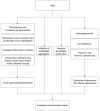Inappropriate Use of Proton Pump Inhibitors Increases Cardiovascular Events in Patients with Coronary Heart Disease
- PMID: 36578351
- PMCID: PMC9792105
- DOI: 10.2147/IJGM.S392767
Inappropriate Use of Proton Pump Inhibitors Increases Cardiovascular Events in Patients with Coronary Heart Disease
Abstract
Antiplatelet drugs, as the cornerstone of the treatment of coronary heart disease, control the progression of the disease, but bring a higher risk of gastrointestinal bleeding. Relevant guidelines recommend the use of proton pump inhibitors (PPIs) to minimize the risk of gastrointestinal bleeding in patients receiving dual antiplatelet therapy. But for people at low risk of gastrointestinal bleeding, the harms associated with routine use of PPIs may far outweigh the benefits. PPIs increase the risk of lower gastrointestinal bleeding, inhibit the effect of antiplatelet drugs, impair vascular endothelial function, meanwhile induce hypomagnesemia, iron deficiency, vitamins D and K deficiency, etc. Eventually, PPIs may lead to an increase in cardiovascular events. However, the situation is that PPIs are often overused. This review elucidates the mechanisms by which PPIs increase cardiovascular events, thereby reminding clinicians to rationally prescribe PPIs.
Keywords: antiplatelet; cardiovascular events; lower gastrointestinal bleeding; proton pump inhibitors; vascular endothelial function.
© 2022 Hu et al.
Conflict of interest statement
The authors report no conflicts of interest in this work.
Figures
References
-
- Levine GN, Bates ER, Bittl JA, et al. 2016 ACC/AHA guideline focused update on duration of dual antiplatelet therapy in patients with coronary artery disease: a report of the American College of Cardiology/American Heart Association Task Force on clinical practice guidelines. J Am Coll Cardiol. 2016;68(10):1082–1115. doi:10.1016/j.jacc.2016.03.513 - DOI - PubMed
-
- Guo CG, Zhang F, Wu JT, et al. Divergent trends of hospitalizations for upper and lower gastrointestinal bleeding based on population prescriptions of aspirin, proton pump inhibitors and Helicobacter pylori eradication therapy: trends of upper and lower gastrointestinal bleeding. United European Gastroenterol J. 2021;9(5):543–551. doi:10.1002/ueg2.12067 - DOI - PMC - PubMed
-
- Shi W, Ni L, Yang J, et al. The clinical impact of proton pump inhibitors when co-administered with dual antiplatelet therapy in patients having acute myocardial infarction with low risk of gastrointestinal bleeding: insights from the china acute myocardial infarction registry. Front Cardiovasc Med. 2021;8:685072. doi:10.3389/fcvm.2021.685072 - DOI - PMC - PubMed
Publication types
LinkOut - more resources
Full Text Sources


